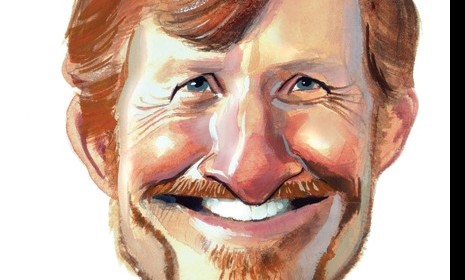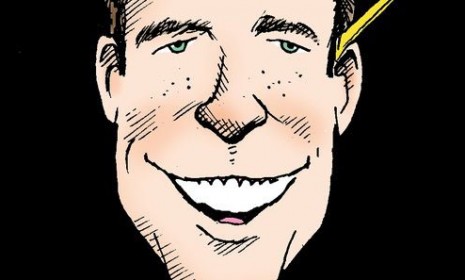The GOP decline starts Phase Two
Republicans seem to be enjoying their August delirium and perhaps they should. For them, it only gets worse from here as the economy improves and Democrats ride growth—and their enactment of health-care reform—into the midte
A free daily email with the biggest news stories of the day – and the best features from TheWeek.com
You are now subscribed
Your newsletter sign-up was successful
History does repeat itself—its central plot is recognizable even if the details of the drama are different. In a classic New Yorker cartoon of 1936, a gaggle of the affluent, including women in fashionable fur, stop outside a tony Manhattan residence where a tuxedoed butler is serving drinks. They tell their friends inside: "Come along. We're going to the Trans-Lux to hiss Roosevelt."
The legendary cartoonist Peter Arno perfectly captured the ideological frustration of the right wing as it watched an activist government, led by a president on course for a second electoral triumph, usher in economic recovery and major reform, including Social Security, which gained the support of only one Republican on the crucial vote before final passage.* (Yes, the more things change, the more they stay the same: See this year's vote on the economic stimulus bill.)
In 2009, the hisses of the old plutocracy have escalated into the caterwauling of a manufactured mobocracy intent on shouting down members of Congress and fellow citizens who come to community centers to ask honest questions. The screamers have been summoned into battle by Limbaugh, Beck and assorted demagogues, whose own hate speech is abetted by prominent Republicans ranging from Senate minority leader Mitch McConnell to Newt Gingrich and the shameless Sarah Palin, with her despicable prevarication that the "evil" Obama health reform provides for a "death panel" with the power to deny care to her Down syndrome child.
The Week
Escape your echo chamber. Get the facts behind the news, plus analysis from multiple perspectives.

Sign up for The Week's Free Newsletters
From our morning news briefing to a weekly Good News Newsletter, get the best of The Week delivered directly to your inbox.
From our morning news briefing to a weekly Good News Newsletter, get the best of The Week delivered directly to your inbox.
Ironically, the lies and legions of the right reached fever pitch at the moment the news arrived that, once again, activist government is succeeding in the wake of free market failure on a scale not seen since the Great Depression. Despite predictions that unemployment would soar above ten percent, the rate instead fell for the first time in a year. There is now a near-consensus, except among doctrinaire true believers, that federal decisions from the bank bailouts to the stimulus package not only prevented economic catastrophe, but have begun to spark an economic revival.
New home sales and home prices have ticked up; so have average weekly earnings. The pain isn't over, especially for the millions who are out of work. We'll see additional losses because employment growth lags economic growth. But growth seems likely to elide into positive territory during the second half of the year, with the recovery gaining momentum as we enter the midterm election year of 2010.
The instant news cycle, which has trumpeted the bad news, will turn around as the economy does. Increasingly, we'll hear that America's on the up, with the predictable tidal effects on our national politics.
First, it will lift not only standards of living but the standards of our public life, confounding those who would trump democracy with mobocracy. Our system of free and representative government would be steadily corroded if the goons who prevented a fair vote count in Dade County, Florida, in 2000 became the prevailing new order in debate and decision. As the economy improves, they'll still be out there, marching to Limbaugh's tin drum, but in diminishing numbers. Their rants will alienate the vast majority of voters—discrediting their own case, and any politician associated with them.
A free daily email with the biggest news stories of the day – and the best features from TheWeek.com
Republicans already—perhaps irretrievably—are. They expected to profit from economic pain; but with the turnaround coming sooner than expected, their political pain is almost certainly just beginning. When a new President moved decisively to counter the downturn, the GOP could have said in effect: "We don't agree with everything he's doing, but we'll let Obama try to fix the problem." Instead, they obstructed to no purpose-hoping to reap the benefits of failure. As prisoners of a hardcore base that is increasingly base, maybe they would not dare to take a conciliatory tack. In any event, they've left an indelible impression in the public mind with a thousand statements in which they didn't just warn of failure, but seemed to root for it. (Think of Alabama Senator Richard Shelby foreseeing financial disaster or House Minority Leader John Boehner insisting that the country is "really, really in trouble.")
This won't be forgotten at the ballot box next fall. The Republicans, who lost 200 Congressional seats between 1930 and 1936, won't suffer that badly now—history can't completely replicate itself in a world with so many safely gerrymandered districts. But the GOP will be punished for attempting to block recovery.
The President and his party are already getting some credit in the most recent CNN poll. The stimulus package had pumped 100 billion dollars into the economy by the end of June, at a pace due to accelerate over the coming year. It has already saved a million jobs, according to analysts, and added a full percent to economic growth.
The other side senses the trend, so we can expect to see a rising tide of contrived and alternative explanations for recovery. But while the truth may be less important than ideology to Republican apologists, it does matter to the American people. And no expedient or tortured argument that Obama has had nothing to do with the recovery—or that it would have occurred regardless of White House policy—will persuade anyone outside Republican ranks.
Finally, the economic news should—and I believe will—embolden Democrats to pass health-care reform worthy of the name. As the economy rises and mobocracy declines, Democrats will hold the high cards in the next congressional campaign. They will be rewarded for the stimulus they passed and for a health-care bill they enacted despite the snarling gangs of August. America will be changed.
In 2010 and 2012, Democrats will not only win elections; they will achieve a political transformation—the Obama era, with progressive values ascendent. An addled, ideologically paralyzed Republican Party will be left to contemplate another famous Peter Arno cartoon, in which an airplane designer watches his jerry-built contraption go down in flames. "Well, back to the old drawing board," he says. The economy will recover. Until they go back to the drawing board, Republicans won't.
*This sentence has been corrected. It originally stated that Social Security was passed "without a single Republican vote in the House." After Republicans failed to kill Social Security legislation in a procedural vote, a majority of Republicans voted for its final passage.
-
 Political cartoons for February 10
Political cartoons for February 10Cartoons Tuesday's political cartoons include halftime hate, the America First Games, and Cupid's woe
-
 Why is Prince William in Saudi Arabia?
Why is Prince William in Saudi Arabia?Today’s Big Question Government requested royal visit to boost trade and ties with Middle East powerhouse, but critics balk at kingdom’s human rights record
-
 Wuthering Heights: ‘wildly fun’ reinvention of the classic novel lacks depth
Wuthering Heights: ‘wildly fun’ reinvention of the classic novel lacks depthTalking Point Emerald Fennell splits the critics with her sizzling spin on Emily Brontë’s gothic tale
-
Issue of the week: Who killed the Twinkie?
feature The seemingly imperishable Twinkie has finally met its match, and its name is Big Labor.
-
Issue of the week: Apple’s patent victory over Samsung
feature Apple's “sweeping victory” is among the biggest intellectual-property triumphs on record.
-
Issue of the week: Goldman Sachs’s ‘toxic’ culture
feature Greg Smith’s stinging public resignation from Goldman Sachs landed on Wall Street “like a bomb.”
-
Issue of the week: Can a mortgage deal revive housing?
feature Five big banks reached a settlement with state and federal officials to pay $26 billion to offset some of the damage caused by their misdeeds in the foreclosure crisis.
-
Issue of the week: Europe gets downgraded
feature Standard & Poor's lowered the credit rating for nine European nations, indicating that Europe has not yet convincingly dealt with the debt crisis.
-
 Tom Toles: Cartoonist of the Year
Tom Toles: Cartoonist of the Yearfeature Meet the winner of The Week's Cartoonist of the Year award
-
 Cartoonist of the Year finalists
Cartoonist of the Year finalistsfeature A brief look at this year's nominees
-
Issue of the week: Calling out the crash’s culprits
feature The Senate's Permanent Subcommittee on Investigations has just published its 635-page report on the financial crisis.